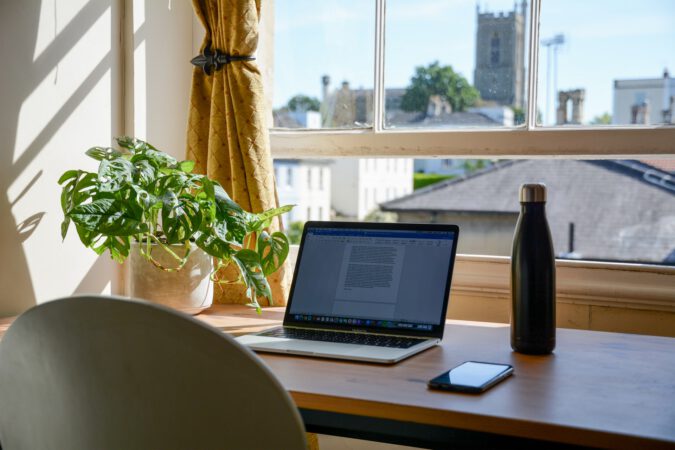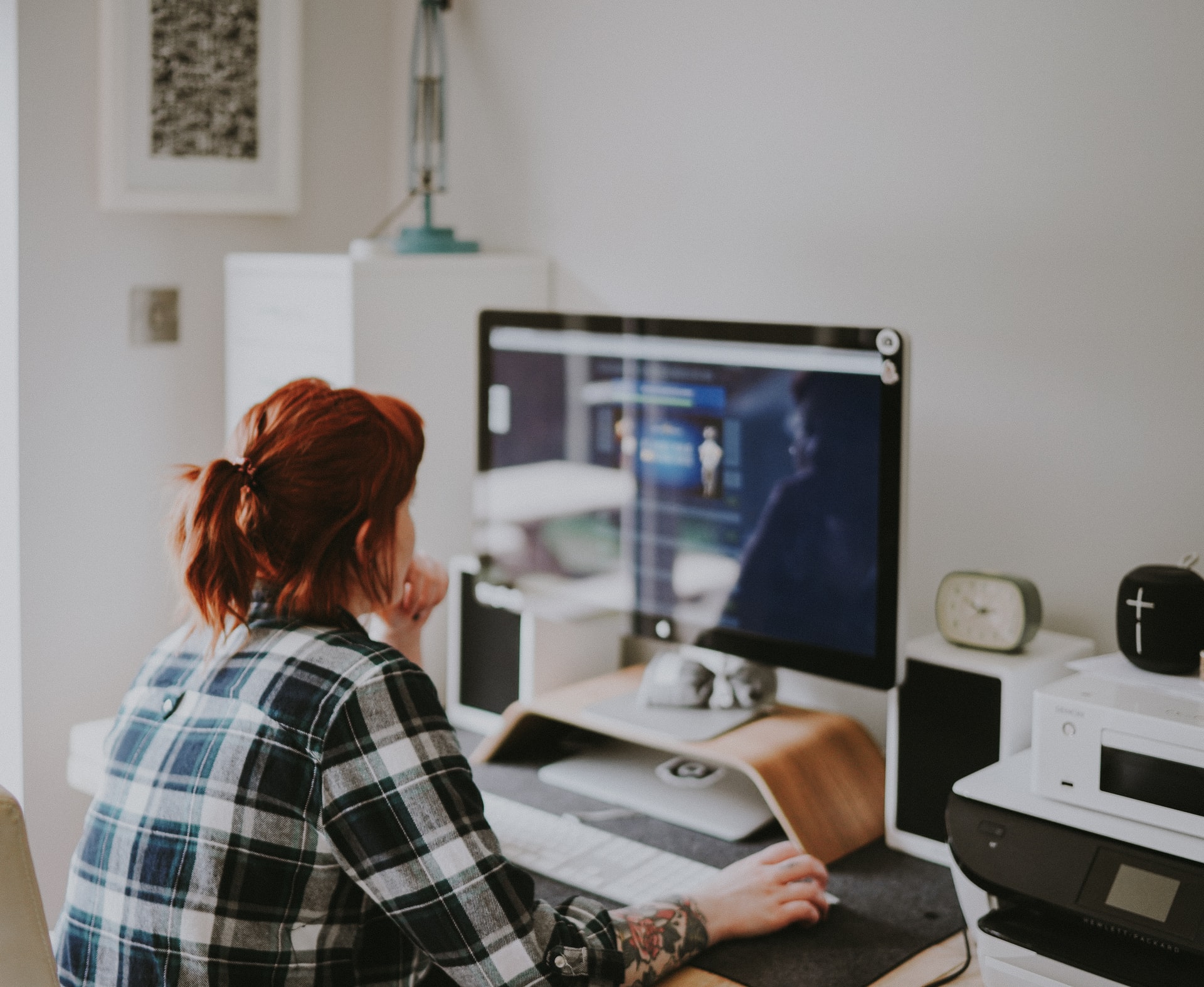It makes no difference if you are self-employed and wish to build a small business website or if you are an office worker who works from home.
You want to avoid doing things that are ineffective! There are many things that can get in the way, like taking the dog for a long walk, wasting too much time on your phone, or getting caught up in a TV show.
Working from home may initially be associated with feelings of freedom, self-determination, and relaxation. The office with the boss and colleagues is a long distance away.
Working as productively as at the office takes a high level of discipline, self-organization, and communication. These points may present novel problems to folks who normally commute to work in the morning.
The issue is that working from home combines professional and personal aspects of life under one roof. As a result, it’s simple to become distracted, mixing things up until you can’t tell professional from personal.
To work well from home, you need to have a clear set of work habits, be good at managing your time, and be aware of your own health.
The key to working from home successfully is to design an atmosphere and methods that work for your own job needs and preferences. The following pointers will assist you in doing so!
1. Stay Away from Social Media
A quick glimpse at Instagram or a fast check of Facebook may quickly become a time eater, but there are methods to resist these temptations.
The simplest way is to disable social media notifications on your smartphone or to put it on silent mode entirely. This needs discipline but aids in concentration. If feasible, schedule your private chats outside of business hours.
2. Design Your Own Workspace
Whether you have a vast home office or a nook in your kitchen, having your own office or at least a dedicated workspace is essential. Even city people with little room should set aside an area for work. This location becomes mentally associated with the professional activity over time.
It’s convenient to sit on the couch with a laptop, but the posture and ergonomics aren’t ideal, and there’s usually a TV nearby that can be a distraction. A desk is also an excellent choice for having a location for two monitors, which can be handy and enhance productivity.
Just as your bed should be reserved for sleeping, so should your workspace. If you work in different parts of your house, such as the kitchen and the living room, you risk dispersing work documents and not having them at your fingertips.
3. Avoid Postponing Tasks
Because you’re not restricted by office hours, it’s simple to put things off until later in the day, or even the next day. However, this produces tension because the postponed activities might easily collide with one or more deadlines, and if something unexpected happens – such as an Internet outage, illness, or the illness of a family member – you may miss the deadline.
Then it’s a matter of getting things done quickly. You will be unable to meet the time constraint established in point.

4. Put Time Constraints on Yourself
Set specific work hours and breaks, and convey them in your personal life.
Most people are unaware that you work from home until you tell them. Remember that you must teach others how to deal with you and your working hours. It doesn’t help to turn off all distractions like smartphones if your landline is always being used for private calls.
Otherwise, those around you will rapidly grow accustomed to the fact that you appear to be available at all times.
Set a time when you will be completely finished with your daily tasks. Working from home does not imply that you do not have a personal life.
5. Put Off Chores ‘Til Later
It’s tempting to put the dishes away or take a break to vacuum while you work, but this can disrupt your flow and concentration. As with everything else, make sure you schedule it for a precise time each day! Do not casually include housework in your work routine, especially if you are a neat person.
6. Make a Timetable
Your calendar should function in the same way that you organise yourself. For example, if you enjoy planning every minute of your day, then load it with breaks. If you prefer a to-do list, make one and cross things off as you go.
Do you, for example, like to spend the first 15 minutes of your day developing a priority list, then going through your emails to see how that list might be affected? Then consider your main priorities and plan them accordingly, with 15-minute intervals in between.
You don’t need such a detailed timetable if you choose it and your activity allows you to adapt to the conditions of the day. However, you should have a plan for each day to ensure that you stay on track and meet your objectives. And, regardless of your style, make sure your day is planned in a way that reflects your natural strength and vitality.
When you have projects to do, why do conference calls at the end of the day? If you’re feeling creative, block out time in the morning to think and finish crucial activities.
Schedule meetings before noon if the job takes hours of concentrated effort. You should set aside the afternoon for project and task work. By constantly blocking out this time, you train coworkers and project partners to respect your time and productivity.
7. Exercise More Vigorously at Least Once a Day
Working from home puts your physical health in greater danger than you realize. Even those who work in an office walk a mile or more each day to get to their car, to lunch, and so on. Maintaining your physical fitness!
Eating right after work and then relaxing on the couch is bad for your health and your ability to concentrate. When the weather permits, try to participate in sports activities. You spend the entire day indoors, so you should save it for your workout.
8. Automate as Much as Possible!
Technology can be quite beneficial! Create email rules to filter out unimportant communications during business hours, schedule emails and social media postings in advance, and use various ringtones for different people to know when not to answer your phone.
It makes sense to work with digital assistants. But don’t simply plan your job activities using it; also plan crucial personal things and coordinate the two. This ensures that there are no surprises on the job and that key tasks are not overlooked.
9. Determine Your Focus Zone
Set yourself up and clean up your workspace – a clean environment allows you to focus and gives mental structure. Then, grab a cup of coffee or tea and attempt to unwind for 15 minutes before diving into your task. Then, prioritize your daily to-do list and plan out the rest of your day.
It is critical that you do not arrive at work hastily. Working from home removes the morning and evening commute. You can use this time in the morning to get ready for the day. Create a routine for starting the day and working quietly. This could include breathing exercises or yoga.

10. Establish Appropriate Priorities
Remove all activities that just serve to fill time but add no value. Make a list of the things you need to complete on a daily, weekly, monthly, and yearly basis. Take note of how each one contributes to the completion of the project and your objectives. Leave them if it doesn’t!
11. Knowing When and How to Clock Out
The most prevalent error is believing that working from home gives you more time to work and a better work-life balance. Work is work, no matter where you do it or how much you enjoy it. It must be completed. You also require a personal life.
If there is no physical barrier between the two, such as a geographical distance between the office and your house, it is easy to work too many hours and have less time to spend with family and friends.
It can be tempting to work after supper or on Sunday afternoons, but if you feel like you’re working all the time, you’ll rapidly burn out. That is why you should keep to a work schedule and optimize your work days so you can enjoy your vacation time.
Having a routine that shows the difference between your workday and your free time can help you tell the difference and make the switch.
12. Take Pause
It can be tough to determine when and how long to take a break. If you take too many breaks, it can feel like you’re losing focus, but taking too few breaks can be counterproductive because you’ll be weary halfway through the day.
Is there one break that everyone should take? A break for lunch.
You may believe that wolfing down lunch in front of your computer is more productive. However, taking a proper lunch break is essential, especially if you work from home. It’s not just about refueling your body with food; your mind also requires a break. Furthermore, studies have shown that when you are more conscious during meals, you enjoy them more and feel more satiated.
13. Dress as if You Were Heading to the Office
According to Karl Lagerfeld, “anyone who wears jogging trousers has lost control of their lives.” You may disagree with this remark, and everyone is free to dress however they wish at home. Wearing the proper clothes for the right occasion, on the other hand, helps you feel fantastic.
If video meetings are not on the daily calendar, it is easy to spend the workday in pajamas or comfy jogging clothes. You’ll adopt the typical routine and switch into business mode more quickly if you take the time to get ready at home as you would on a regular day.
After work, you can change out of your business clothing and into your comfortable after-work attire, thus separating leisure time from work time.


